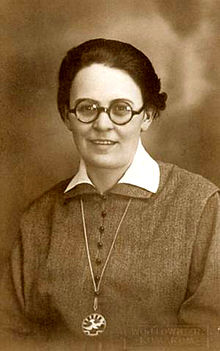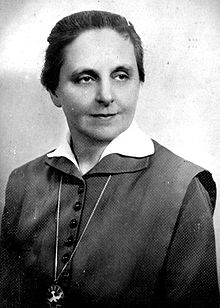Sára Salkaházi
Sára Salkaházi (born Sára Schalkház ; born May 11, 1899 in Košice , Austria-Hungary , † December 27, 1944 in Budapest ) was a Hungarian Catholic nun and martyr . During the German occupation of Hungary and the rule of the Arrow Cross , she saved the lives of numerous Jews and was murdered for it. Posthumously in 1969 she was honored as Righteous Among the Nations . The Roman Catholic Church beatified her in 2006 .
Origin and education
Sára was one of three children of the Lipót and Klotild Schalkház couple, operators of the grand hotel of the same name (demolished in 1964) in Kassa (now Košice, Slovakia ). Her father died early. After finishing school, she trained as a primary school teacher. After the annexation of her hometown to Czechoslovakia , the staunch Hungarian patriot refused to swear allegiance to the new state and then lost her position. She then did an apprenticeship as a bookbinder and later worked as a journalist. She has also been writing literary texts, such as plays and short stories, since she was a teenager. In 1922–23 she was briefly engaged to a prospective estate manager, but broke off the engagement of her own accord.
In her youth, Sára was considered stubborn and rebellious, but also generous and loyal. Her religious beliefs had to deal with crises before she entered the order. She was considered a "modern" woman who liked to smoke and sat in the coffee house.
Life in the Order
In 1927 she got to know the religious order of the Sisters of the Social Service , founded by the Hungarian religious and politician Margit Schlachta only a few years earlier (1923) . The sisters lived according to relatively flexible rules, wore a simple, modern-looking gray religious robe without a veil and were particularly involved in youth and women education and in Christian journalism. In 1929 Sára was allowed to join the order as a novice. At Pentecost 1930 she made her first vows. In the following years she spent herself in many activities, so that in 1934 she had to return to her hometown exhausted. Her superiors saw her exhaustion as uncertainty about her calling, so she was not allowed to renew her vows for a year.
In 1937 she signed up for the mission in Brazil , but the fact that she was still a Czechoslovak citizen prevented an immediate deployment. In the same year she moved to Budapest in order to be able to acquire Hungarian citizenship, but because of the outbreak of war in 1939 she was no longer able to travel to South America. At Pentecost 1940 she made her perpetual vows. Her motto was Ecce ego, mitte me! (Here I am, send me - ( Isa 6,8 EU )). In 1942, in protest against the rise of Nazism , she changed her German-sounding family name to the Hungarian Salkaházi .
Rescuing Jews and Death
The Sisters of the Social Service campaigned vigorously to save the Jews during the Holocaust in Hungary . Sister Sára is believed to have been personally responsible for rescuing around 100 people. In the fall of 1943, she secretly made a vow that only her superiors knew about at the time: She was ready to accept martyrdom if nothing happened to her fellow sisters during the persecution.
On December 27, 1944, Sister Sára's workers' home in Budapest's Bokréta utca was surrounded by Arrow Crossers. The sisters had been reported by an employee, the 18-year-old Erzsébet Dömötör. The young girl had been transferred to another home by Salkaházi the day before because of her “improper” relationship with a soldier quartered in the building. The gunmen took four alleged Jews and the religion teacher Vilma Bernovits with them. Sister Sára came home at that moment, but did not flee, but bravely faced the Arrow Cross men. The six arrested were taken to the banks of the Danube. They had to undress and were then shot ; only one young man managed to escape by jumping into the water. According to witnesses, Sister Sára made a sign of the cross shortly before she was murdered. The bodies were thrown into the Danube and never found.
Afterlife, Honors, and Beatification
Erzsébet Dömötör, who reported the sisters to the Arrow Crossers, was arrested in 1945, but was later able to go into hiding. She was sentenced to ten years imprisonment in absentia in 1949. Her further fate is unknown.
Sister Sára was largely forgotten at first, only a trial against former Arrow Cross members in Budapest from 1966-67 threw light on her role and the circumstances of her death. In 1969 she was from the Jerusalem Holocaust memorial Yad Vashem to the Righteous Among the Nations declared. On September 17, 2006, Sára Salkaházi was beatified as a martyr by the Catholic Church in Budapest .
The place of Salkaházi's execution , the Danube quay south of the Budapest Freedom Bridge ( Szabadság-híd ) on the Pest side, is named after her today. The Hungarian capital honors people who saved Jews during the Holocaust (including Margit Schlachta, Raoul Wallenberg , Carl Lutz , Angelo Rotta ) by naming the quay sections . There is also a park near Bokréta utca in IX. Parish, as well as a parish church and a Catholic school in the XV. Parish named after Sára Salkaházi.
Web links
- Biography on the website of the Vatican (English)
- Online biography of Sára Salkaházi (English)
- Biography on the website of the Sisters of Social Service (Hungarian)
Individual evidence
- ↑ Slávny Hotel Schalkház nechali spustnút 'a zbúrat' . kosicednes.sk, September 14, 2017. Accessed: July 13, 2019.
- ^ József Szécsi: Akit nem avattak boldoggá: Bernovits Vilma hitoktató. Lecture from November 3, 2010. (Hungarian)
- ↑ Szécsi, ibid.
- ↑ Sára Salkaházis entry on the website of Yad Vashem
- ↑ Beatification. salkahazisara.com
- ↑ Parish of Újpalota with the patronage " Transfiguration of the Lord " and "Blessed Sára Salkaházi"
- ↑ Sára-Salkaházi School, Budapest
| personal data | |
|---|---|
| SURNAME | Salkaházi, Sára |
| ALTERNATIVE NAMES | Schalkház, Sára (maiden name) |
| BRIEF DESCRIPTION | Hungarian religious, savior, martyr and blessed |
| DATE OF BIRTH | May 11, 1899 |
| PLACE OF BIRTH | Kassa , Austria-Hungary |
| DATE OF DEATH | December 27, 1944 |
| Place of death | Budapest , Hungary |



